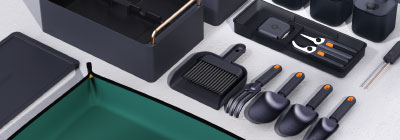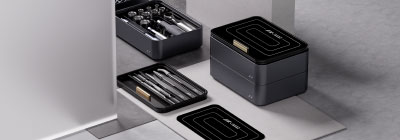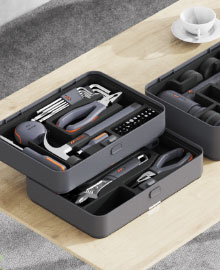
How to Repair a Digital Watch: Essential Tools for DIY Repairs
Digital watches are convenient, stylish, and functional, but like any electronic device, they can sometimes stop working properly. Whether the display goes blank, the buttons stop responding, or the battery dies, many common issues with digital watches can be fixed at home with the right tools and some basic knowledge. This guide will walk you through the essential tools for repairing a digital watch and provide step-by-step tips for DIY enthusiasts.
Understanding Digital Watch Components
Before diving into repairs, it's important to understand the main components of a digital watch. Most digital watches consist of:
-
Watch Case: Protects the internal components from dust, moisture, and damage. Cases can be made from plastic, stainless steel, or aluminum.
-
Display Module: The screen that shows time, date, and other functions. Digital watches often use LCD or LED displays.
-
Battery: Powers the watch; a dead battery is the most common reason for watch failure.
-
Circuit Board (Movement): Contains the microchip and electronic circuits that control watch functions.
-
Buttons and Sensors: Allow the user to set time, start a stopwatch, or access other features.
Essential Tools for Digital Watch Repairs
A successful DIY repair relies on having the right tools. Here’s a list of tools every digital watch repairer should have:
1. Precision Screwdriver Set
Digital watches often have tiny screws that require precision screwdrivers. A good set should include multiple sizes and types, such as Phillips, flathead, and Torx. Aluminum-handled sets with magnetic tips are especially useful for handling small screws without losing them.
2. Watch Case Opener
A watch case opener allows you to safely remove the back of the watch. Depending on your watch, you may need:
-
Knife-style openers for snap-on cases
-
Wrench-style openers for screw-back cases
Using the correct opener prevents scratches and damage to the watch casing.
3. Tweezers
Non-magnetic and anti-static tweezers are essential for handling small components, such as batteries, screws, or tiny circuit elements. They give precision without the risk of short-circuiting sensitive electronics.
4. Watchmaker’s Loupe or Magnifying Glass
A magnifying tool helps you clearly see small parts and detect worn-out components. A 10x loupe is standard, but higher magnifications may be needed for intricate digital circuits.
5. Battery Tester and Replacement Batteries
A dead battery is the most common issue in digital watches. A battery tester helps determine whether your battery is still functioning, and having a variety of replacement batteries ensures you can fix different watch models without delay.
6. Soft Cloth and Cleaning Tools
Dust and dirt can interfere with watch functions. Use a microfiber cloth, soft brushes, and even compressed air to clean internal components without causing scratches.
7. Small Plastic Pry Tools
Pry tools are helpful for opening snap-fit cases or separating delicate parts without damaging the plastic or metal surfaces.
8. Anti-static Mat and Wrist Strap
Electrostatic discharge (ESD) can damage electronic components. Using an anti-static mat and wrist strap reduces this risk during repairs.
Common DIY Repairs for Digital Watches
Now that you have the right tools, here are some typical repairs you can perform at home:
1. Battery Replacement
The most straightforward repair involves replacing a dead battery:
-
Open the watch case using a case opener
-
Carefully remove the old battery using tweezers
-
Check the battery type and insert a replacement with correct polarity
-
Close the case securely
Always test the watch before fully sealing it to ensure it works properly.
2. Cleaning the Watch
Dust, dirt, or moisture can cause malfunctioning:
-
Remove the watch back and battery
-
Use a soft brush or compressed air to clean the internal components
-
Wipe the case and screen with a microfiber cloth
-
Reassemble and test the watch
Regular cleaning can prevent future problems and prolong watch life.
3. Button Repair
If buttons are sticking or unresponsive:
-
Open the watch case carefully
-
Inspect the button mechanism for dirt, corrosion, or damage
-
Clean with a soft cloth or a cotton swab dipped in isopropyl alcohol
-
Test the buttons before reassembling the case
4. Screen or Display Issues
Screen problems are trickier and may require component replacement:
-
Identify whether the issue is with the display module or the circuit board
-
Purchase a compatible replacement screen
-
Carefully remove the old display and install the new one using tweezers and a loupe
-
Test all functions before sealing the watch
Tips for Safe DIY Watch Repairs
-
Work in a well-lit area to see tiny parts clearly
-
Keep screws and small components organized to avoid losing them
-
Avoid excessive force; fragile components can break easily
-
Consult the watch manual or manufacturer website for specific guidance
-
Take photos during disassembly to remember how parts fit together
When to Seek Professional Help
Some issues are better handled by professionals, such as:
-
Water damage inside the watch
-
Complex circuit board failures
-
Cracked screens or damaged LCD modules
Attempting these repairs without experience can cause permanent damage.
About JIMIHOME®
As a trusted brand for household tool solutions, JIMIHOME® has been dedicated to providing high-quality and practical tools since 2018. With over 300 products ranging from hand tools and power tools to digital device repair kits, JIMIHOME® caters to everything from daily home maintenance to precision DIY repairs. Whether you're replacing batteries, fixing buttons, or carefully disassembling watches and electronics, JIMIHOME® offers reliable tools that make every DIY project easier and more efficient. Choose JIMIHOME® to equip yourself with professional-grade tools for all your home and electronic repairs.




Leave a Comment